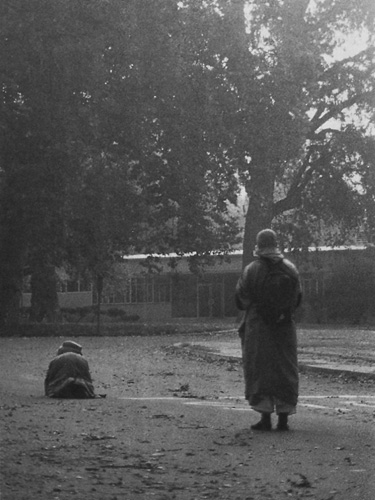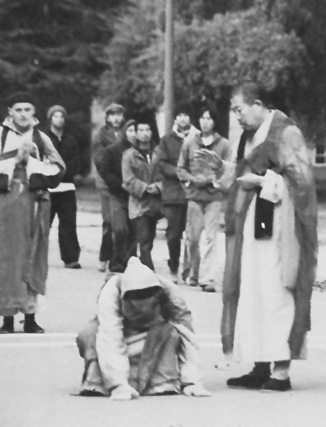Two American Buddhist monks, Heng Sure and Heng Ch’au, undertook a pilgrimage in 1977 with vows to bow to the ground in full prostration every three steps. Beginning at Gold Wheel Temple, the Los Angeles branch of the Sino-American Buddhist Association, the two monks traversed eight hundred miles over a two-and-a-half-year period before arriving at the City of Ten Thousand Buddhas in Ukiah, California. The following is excerpted from With One Heart Bowing to the City of Ten Thousand Buddhas, a record of their travels, published by the Sino-American Buddhist Association and the Buddhist Text Translation Society.

Bow not for something—to get something for yourself. Bow to empty yourself, to repent and clean out your mind. With no thought of self, all benefit. With a thought of self, all suffer. Bow to the Buddha-nature in all beings, sentient and insentient. With no self the Buddha appears. Can you do that? Heng Ch’au?
When you bow slowly through these big hills and vast landscape you see that all of it is made up of tiny little particles—dust motes, atoms. Everything either can be broken down to empty space or from empty space built up into an ocean, a person, or a mountain.
Heng Sure: Some people look at us and see holy men, others see devils. Some see us as blessings and others see us as threats. We are doing the same work, the same bowing before all these different folks—it’s what they bring to it that shows them what they see.
There is no objective reality, there’s no objectivity. One navy flier saw us bowing and thought at first we were hexing the base. After talking with us he thought we were protecting it. Were we any different? “No big, no small, no inside, no outside. Practice it yourself, end it yourself, and make your own arrangements.”
Heng Ch’au: We started to bow at night to avoid arrest and hassles between 10:00 P.M. and 6:00 A.M. Bowing time is increased, sleeping time decreased. We still bow in the day except now we bow after evening recitation until 2:00 or 3:00 A.M. and then quietly burrow in someplace inconspicuously to nap for a few hours. Experimenting. It has its flaws and advantages.
Positive: cold and quiet; stillness outside allows us to hear more clearly noise inside. Undisturbed by questions and traffic. More edge and pressure.
Negative: stumbling in and out of ruts and holes, uptight over night sounds you can’t see: “What just crawled over my hand?” Can’t see horse and dog shit or broken glass. Exhausting.
Heng Ch’au: Sometimes on these long stretches of 101, bowing starts to feel like being lost in a snowstorm in the high mountains. After awhile there is “no self or others, no living beings, no lifespan.”…The sun breaks loose the kinks and glue, and the wind flushes and cleanses the mind like running water. Clean and empty, the vastness of the sea and stars is like your own quiet inner space. What must the state of the Buddha be like, where
One’s body permeates everywhere like space and peacefully unmoving, one fills up all the ten thousand directions
—Avatamsaka Sutra
Heng Ch’au: We have had seven police contacts in two days, mostly at night because of the county ordinance that prohibits overnight camping or stopping except in designated camping areas. We call it the “non-dwelling ordinance,” as it helps us “produce the mind that dwells nowhere.” If you do dwell, you are “subject to arrest” which is our present condition. We will have to yield yet not retreat somehow to this one.

Heng Ch’au: Bowing up the early-morning highway as a pack of coyotes stop and watch us for a while and then slip off into the brush and undergrowth. Soon we see deer running all around us from the coyotes and packs of wild dogs. The dogs camped in a wooded area next to our campsite last night—howling and snarling, sneaking over to check us out under the cover of fog, while we were doing t’ai chi and meditating in the dark. We had a little feel of what constant fear and vulnerability animals live under. Always hunted, always hunting.
Heng Ch’au: When adults want to know what we are doing, they ask and talk. When children want to know what we are doing, they watch and bow along. The Buddhadharma is children’s dharma. Children learn by doing. They fidget and fall asleep with words and talking. All of the “words of wisdom” are in your own heart, so why waste time listening to someone else speak them? The Buddhadharma is the same. The principles in the sutras come from our own hearts. The wisdom and happiness of all buddhas comes from our own minds.
Thank you for subscribing to Tricycle! As a nonprofit, we depend on readers like you to keep Buddhist teachings and practices widely available.